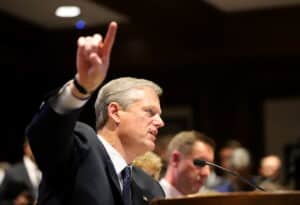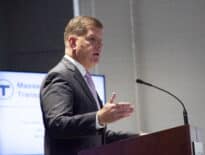
Gov. Charlie Baker told an Oct. 8, 2019 Transportation Committee hearing that "our economy is growing, our population is growing, and the economic activity that dominates our commonwealth is constrained by the limits of our current system." Photo by Sam Doran | State House News Service
Gov. Charlie Baker’s and leading legislators remain divided on transportation funding priorities following a hearing Tuesday on Baker’s proposed $18 billion transportation bonding bill, which would send just under $6 billion to capital projects on the MBTA and commuter rail systems.
Baker told the committee that funding is “the easiest of the critical paths we face” and that the bigger issue is completing projects, but as the House prepares this fall to debate additional revenue options, committee chairs disagreed.
Rep. William Straus and Sen. Joseph Boncore, the committee’s two chairs, told reporters after the hearing that they believe the state needs to bring in new money to pay for its wide-ranging infrastructure needs.
“This committee has an awesome responsibility to not do what previous governors and Legislatures have done in ensuring we’re just borrowing against our future,” Boncore said. “Our responsibility is to ensure we have the revenue to pay for that. It’s an issue that our concern is this bond bill doesn’t address adequately.”
Baker’s bill also calls for reforms to contract and procurement practices to speed up projects, aims at reducing congestion through local programs and tax credits, and outlines a new revenue source that could direct tens or hundreds of millions of dollars every year to public transit.
“In some ways, we have enviable problems: our economy is growing, our population is growing, and the economic activity that dominates our commonwealth is constrained by the limits of our current system,” Baker said at a Tuesday committee hearing, adding that the bill will “allow us to create the transportation infrastructure we need to continue to grow and serve our people.”
The debate comes as the MBTA wrestles with a $53 million mid-year operating deficit. Transportation Secretary Stephanie Pollack said during the hearing that the state needs additional forms of capital funding, but does not need new operating revenue from the legislature.
That larger deficit is being driven by revenues from real estate and advertising that are not meeting the T’s projections, “fuel price spikes,” and overtime expenses, according to MBTA Chief Administrative Officer David Panagore’s presentation at a control board meeting on Monday.
Pollack said in December 2015 that the T was projected to run a $427 million operating deficit in fiscal year 2020, but after reforms by the Fiscal and Management Control Board, the mid-year estimate is now $53 million. That amount, she said, “is well within the size of deficit problems that have come and gone over the last four years and have been handled within the T’s existing operating sources.”
About $10.3 billion in Baker’s bill would go toward roads and bridges, according to a Massachusetts Taxpayer Foundation analysis, including a $1.25 billion reauthorization for a “next-generation” bridge maintenance fund.
The MBTA would receive about $5.7 billion, according to the MTF, with much of that going to cover several already-under-construction projects such as South Coast Rail and the roughly $2.3 billion Green Line Extension.
Baker’s bill also includes $250 million that could go toward a large-scale reimagining of the commuter rail system. A commission is studying several substantial options, including increasing service to every 15 or 30 minutes or electrifying the system, and while it remains unclear which option they will select, the MBTA’s oversight board will take up the topic in the coming months.
Announced two weeks before the administration published a study of roadway congestion, the bill includes several components aimed at reducing traffic. One suggestion is a $50 million local bottleneck fund, which would pay for infrastructure improvements on locally owned roads where specific choke points slow cars down.
The bill would also create a $50 million tax credit program, offering employers $2,000 per employee permitted to work from home. Baker said Massachusetts and the Boston area lag behind similar areas in telecommuting rates, and by getting cars off the road, he hopes to see a reduction in congestion.
However, several transportation advocacy groups criticized the idea during Tuesday’s hearing.
“This investment could be better spent improving our transportation system,” said Chris Dempsey, director of Transportation for Massachusetts. “The credit as proposed would provide a higher per trip subsidy than is provided to the MBTA.”




 |
| 
